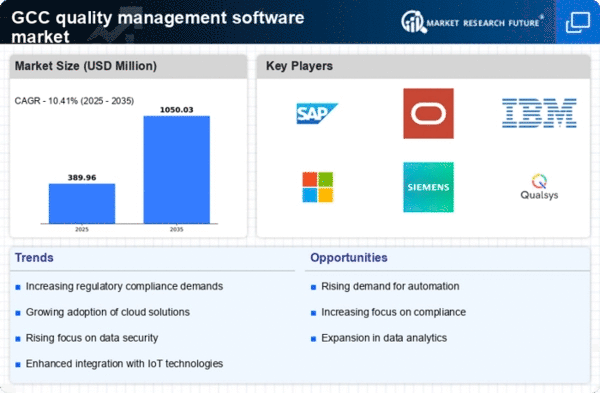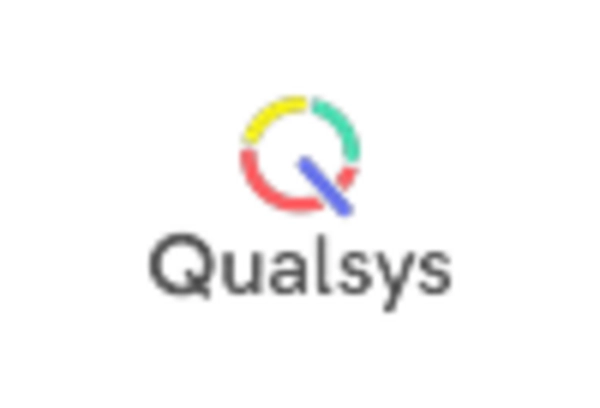Rising Demand for Quality Assurance
The The quality management software market is experiencing a notable surge in demand. This demand is driven by the increasing emphasis on quality assurance across various sectors in the GCC.. Organizations are recognizing the critical role that quality management plays in enhancing operational efficiency and customer satisfaction. This trend is particularly evident in industries such as manufacturing and healthcare, where adherence to quality standards is paramount. As a result, the market is projected to grow at a compound annual growth rate (CAGR) of approximately 12% over the next five years. Companies are investing in quality management software to streamline processes, reduce errors, and ensure compliance with industry regulations, thereby fostering a culture of continuous improvement.
Shift Towards Data-Driven Decision Making
In the quality management-software market, there is a significant shift towards data-driven decision making, which is reshaping how organizations operate in the GCC. Businesses are increasingly leveraging analytics and reporting tools integrated within quality management software to gain insights into their processes and performance metrics. This trend is indicative of a broader movement towards operational excellence, where data is utilized to identify areas for improvement and optimize resource allocation. The ability to analyze real-time data allows organizations to respond swiftly to quality issues, thereby enhancing overall productivity. As a result, the market is expected to witness a robust growth trajectory, with an estimated increase in market size by 15% by 2027.
Emphasis on Customer-Centric Quality Management
The quality management-software market is witnessing a paradigm shift towards customer-centric quality management practices. Organizations in the GCC are increasingly focusing on understanding customer needs and expectations, which is driving the adoption of quality management software that facilitates customer feedback integration. This approach not only enhances product quality but also fosters customer loyalty and satisfaction. Companies are utilizing software solutions to track customer complaints and feedback, enabling them to make informed decisions that align with customer preferences. This trend is likely to propel the market forward, with projections indicating a potential growth of 10% in the next few years as businesses prioritize customer experience in their quality management strategies.
Integration of Mobile and Remote Access Solutions
The quality management-software market is evolving with the integration of mobile and remote access solutions, reflecting the changing dynamics of the workforce in the GCC. As organizations adopt flexible work arrangements, the need for accessible quality management tools has become paramount. Quality management software that offers mobile capabilities allows employees to access critical information and perform quality checks from various locations. This flexibility not only enhances productivity but also ensures that quality management processes are maintained regardless of physical location. The market is likely to see a growth of approximately 13% as businesses increasingly prioritize mobile solutions to support their quality management efforts.
Increased Investment in Compliance and Risk Management
The quality management-software market is significantly influenced by the rising investment in compliance and risk management initiatives within the GCC. Organizations are increasingly aware of the potential risks associated with non-compliance to industry standards and regulations. As a result, there is a growing demand for quality management software that offers robust compliance tracking and risk assessment features. This trend is particularly pronounced in sectors such as pharmaceuticals and food safety, where regulatory requirements are stringent. The market is anticipated to expand as companies seek to mitigate risks and ensure adherence to quality standards, with an expected growth rate of 11% over the next five years.
















